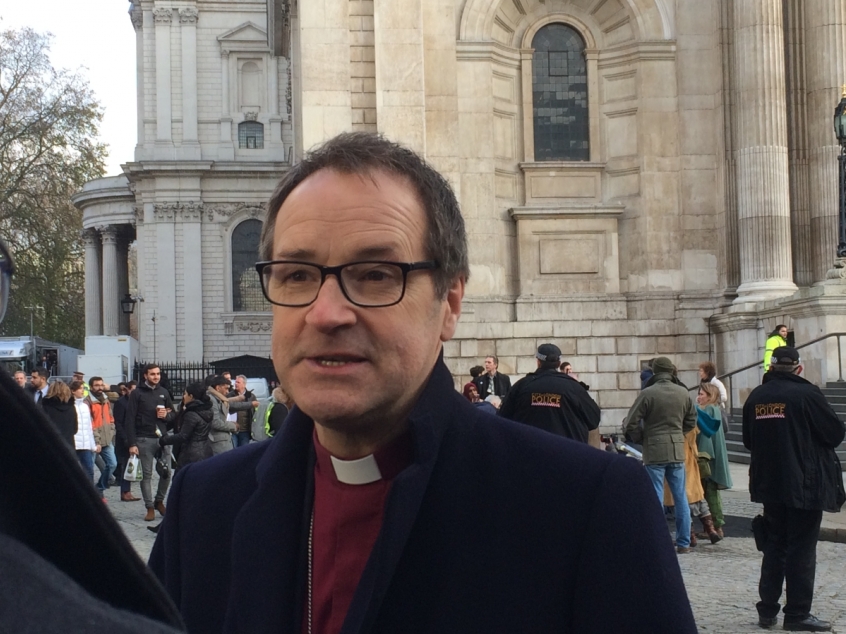The past week has seen emotions running high over the case of Alfie Evans: another vulnerable child made the subject of a complex debate about healthcare, autonomy, the state and even the role of religious groups.
Last night in London an Anglican bishop joined healthcare professionals to discuss the National Health Service (NHS), what Christian 'healing' means, and why believers might need to rethink suffering and death.
Controversial though it may seem to some Americans, there are good theological reasons to back the NHS, said Bishop Graham Tomlin, speaking at St Mellitus College in a talk titled 'Christian healing in the age of the NHS', organised by the Christian Healing Mission.
Tomlin described how the NHS, which turns 70 this year, was a noble idea 'born of the suffering' of the early 20th century. It was something Christians could and can still endorse because, believing human beings are made in the image of God and are universally loved by their creator, they asserted the value and worth of each individual. A service that met a vital human need (health) irrespective of one's social or financial standing was protecting something fundamental to human life.
But a nationalised health service also created challenges for the church, which had previously been a lead provider of welfare and charity. What role was it now to play? Tomlin explored how a commitment to healthcare, particularly for the weakest in society, has been fundamental to Christianity since its inception.

Consider the early Christian care of abandoned infants, or their sacrificial commitment to victims of plague, such that believers took on the infirmity of those they cared for, sometimes losing their own lives ('cheerfully accepting their pain' in the words of one 3rd-century pope) so that others might be healed. Long before the science of communicable disease was medically understood, these Christians knew what it meant to share suffering in the name of love and healing.
Tomlin emphasised however, that a Christian understanding of healthcare is not simply concerned with meeting material deficiencies but bringing about holistic human flourishing. He said: 'True human flourishing means not just the absence of disease and sickness but positive relations of love towards God and other people.'
This is an 'essentially social vision', he added, of anthropology itself inspired by the multi-faceted, relational Trinitarian life of God that means 'we are not just bodies to be healed'.
Tomlin turned to the witness of Jesus, the only world religious leader whose primary activity was that of a healer. But Jesus' miracles were not illustrations of his teaching, Tomlin said, rather it was the other way around. His teaching explained what his visible 'signs' demonstrated, that in Christ's words, 'the Kingdom of God has come to you'. A new state of divine rule was coming about in the midst of this world, a healing and restoration of a broken reality – glimpsed by wonders worked by Christ. Healing miracles were 'the heart of the whole thing' a visible embodiment of God's 'good news' for humanity.
And in the witness of church, stories of healing have not been limited to Christ. Tomlin spoke of the voluminous proliferation of healing claims throughout church history and the 'possibility that on occasion, seemingly in response to prayer, medical healing is somehow accelerated, disease is removed remarkably, and a measure of at least temporary healing takes place.'
Healing for some of course raises more problems than it solves – bringing in questions about prayer and its relation to divine action, and why God doesn't intervene more often. Tomlin cautioned that a reality in which God intervened all the time would be 'a cartoon, not a world', undoing the order of the universe by which we learn its nature, patterns and learn to live responsibly and with limits. Then again, Tomlin added, a world in which God never intervened would suggest Deism: a God far off, who abandoned reality after creating it – an unChristian perspective.
He suggested that miracles are nonetheless 'rare, occasional, real', and emphasised a big picture that set no dichotomies between miracles and medical professionals. 'Christians pray for healing, not just to supplement the work of doctors, certainly not to prove that somehow clergy are more powerful than consultants, but a sign of a bigger picture of human flourishing, a positive vision of what human life in society is meant to be like.'
He pointed to Christ's resurrection, the 'greatest miracle' and a 'momentous interruption' into a 'world of decay', through which new life emerges from death. Neither the NHS nor healing ministries can provide certainty or complete protection, Tomlin said. Prayers go unanswered, medicines can fail. Yet, the resurrection offers an enduring hope, a 'gateway' to the God from whom we came and to whom we shall return.

Tomlin concluded that the church today should 'celebrate and defend' the NHS, protecting the gift of health for all. This vocation, he said, may mean calling government to account. A later panel discussion with Tomlin, two doctors and a hospital chaplain warned of a 'shrinking' and 'exhausted' NHS, and the need for Christians to 'come back' to healthcare, be it through chaplaincy, 'para-health' work like the charity Oasis, or volunteering caring for the vulnerable.
Concluding his lecture Tomlin said that because of the resurrection, Christians understand that death is not ultimate, 'not the worst thing that could happen to you', and so Christians don't fear their demise but believe in the possibility of a 'good death'. He added that this view allows Christians to set limits to healthcare: 'there does come a point when it is no longer wise nor caring to prolong life'.
This perspective was raised again when the panel discussion turned to the case of Alfie Evans. The speakers were wary about making judgments without proper knowledge, but noted the issues of autonomy and interests, and how public opinion may now be shifting to individuaism and a distrust of higher authorities, whether courts, doctors or clergy.
'Life is a good thing', Tomlin said. Our relationships are immensely valuable, but 'death is not the worst thing, because it cannot separate us from God.
'And there's a difference between suffering and evil. We might even say that not all suffering is evil. Suffering that leads you back to God might actually even be a good thing.'
He added: 'We have the resources within our Christian faith, to allow a friend, even a child, with great, great sorrow and [in] tragedy to allow them to go into the hands of God, and not to cling on to life at all costs.'
You can follow @JosephHartropp on Twitter













